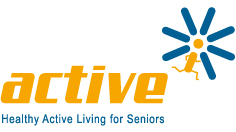| Health behavior change |
Health behavior change
Physical inactivity, sedentary behaviour, an unhealthy diet, stress and disregard for your wellbeing are risk factors for your health. With a healthy and active lifestyle, you can strengthen your personal health resources to slow down your physical and cognitive decline and to enable long-lasting, independent participation in your environment. It is still possible to change your health behaviour as it is never too late to act. But this will be a long lasting process. With your registration on Plan 50+, you already took the first step. The following tips will help you to stay motivated and to change your behaviour so that you lead a healthy and active lifestyle.
-
Create an intention: Before you start to change your behaviour, it is important to create an intention. An intention could be for example: “I want to raise my physical activity level”, "I want to eat more vegetables and fruit”, "I want to handle stress in a better way”. In Plan 50+ you can choose which aspect you want to work on. In each section, you can set a concrete goal. Based on this intention or with this goal in mind, you can start to create concrete plans in the following step.
-
Plan your activities: To realize your intention, it‘s best to define concrete and realistic plans for yourself to increase the motivation to be regularly active in one or more of your chosen aspects. Therefore, you define WHAT you want to do in your daily life and WHEN and HOW you will do it. The Plan 50+ Planner supports you in setting realistic and concrete goals. Additionally you also can note down WHERE and with WHOM you will do your planned activities. For physical activity, it is important to know, that we have only offered a small number of activities out of a large pool of possibilities. Beside walking, swimming, biking, balance and strength exercises, you may also be interested in games (outdoor and indoor), hiking, dancing, aqua gymnastics, Yoga, Tai Chi, or something else. You can do all the activities that we offered as a self-organized activity. Beside this, you might be interested in joining a group with an instructor. Please contact your health insurance company, local sport clubs, and senior centers or search the internet for appropriate offers.
-
Recognize and experience barriers: Even when it is easy to start a physical activity or a healthy diet, it is even more difficult to maintain the new routines. Unexpected events (e.g. unexpected visitors, other people ask for help), other barriers (e.g. high prices for healthy food, bad weather conditions) or your inner couch potato ("I am tired and lazy", "I prefer to read my book today") may hinder you in doing your planned activities or in implementing your intended changes in nutrition. Such barriers are normal and you will experience them more often at the beginning of your active lifestyle. Nevertheless, there is a positive message; there is way to overcome these barriers. Please have a look in the next section.
-
Learn coping strategies and strategies of volitional self-monitoring: If an unexpected event occurs, it is convenient to abstain from the planned activity. True to the motto: ‘Postponed is not abandoned’ you can make a new time for your activity. If unexpected events happen more often, you may adapt your plans. Another possibility is that you get your family may adapt your plans. Another possibility is that you motivate your family and friends to join you in your activity.
To overcome other barriers, you can use so-called coping strategies. This means that you plan an alternative in case of a certain event (In case of x, I will do y). A coping strategy could be for example: “In case of bad weather conditions I will go for a walk in our shopping center instead of practicing outside”. “In case of high prices for vegetables, I will start to plant vegetables by myself”. If you have this possibility in your garden, you gain a great opportunity to be physically active at the same time!
If your biggest enemy is your inner couch potato, you can employ several strategies to fight this enemy: For example, you can make appointments for healthy cooking or physical activities with your friends or you can tell other people about your intentions. In this way you increase the subjective obligation of your intention. To motivate yourself you can furthermore encourage yourself with instructions (“Get up and go!”) or maybe you can try to visualize the positive effects of your activity: “I am sure I don’t want to go, but I know for sure that I will feel great afterwards”, “When I’m back, I’ll be proud of me”. You will have to find your own strategy to overcome inner or external barriers. Test them in several situations and adapt the arguments with your own words.
Finally yet importantly, it is important to consider that it will take time to change a behaviour that was implemented in daily life for years. If you fall back to your “old behaviour” don‘t worry. This is normal at the beginning. If such a thing happens, start again or complete your activity the next time. Even if you abstain once from your plans this does not mean that you are not able to change your behaviour.
|



 Watch the Plan50+ User Manual.
Watch the Plan50+ User Manual.
